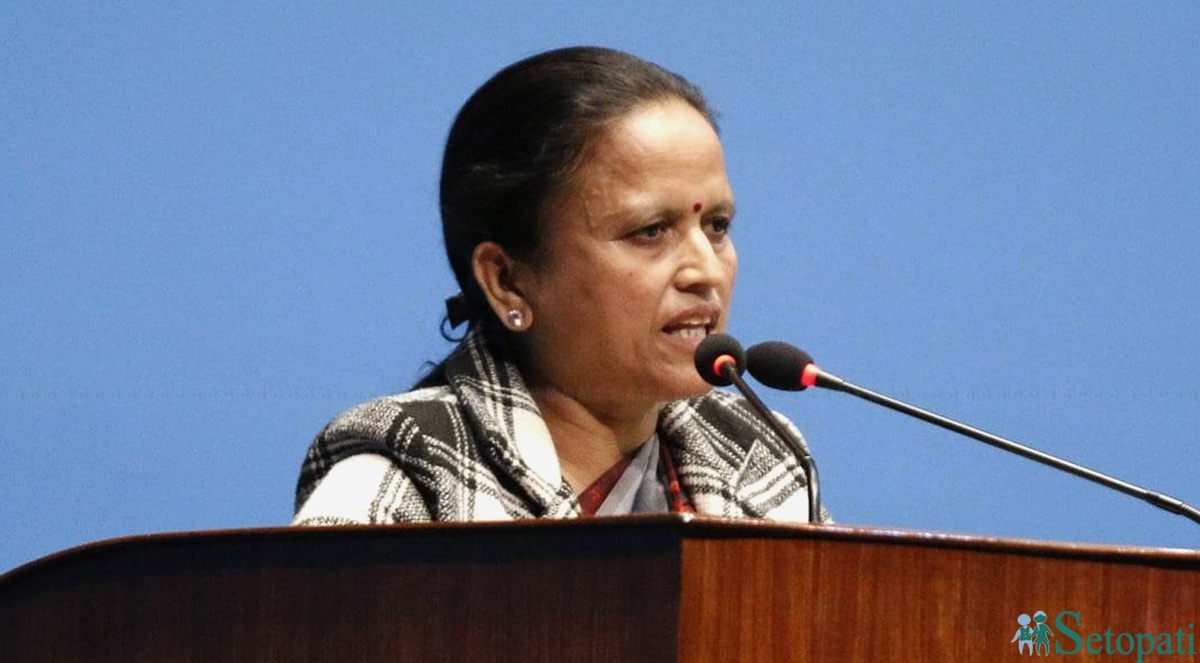The government has presented the third bill for amendment of the Investigation on Enforced Disappeared Persons and Truth and Reconciliation Commission (TRC) Act in the House of Representatives (HoR) on Sunday.
Minister for Communication and Information Technology Rekha Sharma has presented the bill on behalf of Prime Minister (PM) Pushpa Kamal Dahal who also currently oversees the Law Ministry.
The government has presented the bill to complete the remaining works of the peace process.
The main opposition CPN-UML has taken exception to the fact that Minister Sharma was asked to present the bill even though PM Dahal was attending the House meeting.
The government hastily registered the bill in the HoR making some changes in the amendment bill brought by the then Sher Bahadur Deuba government after the Supreme Court (SC) recently ordered to register two writ petitions seeking arrest of CPN (Maoist Center) Chairman and Prime Minister (PM) Dahal reasoning that conflict-era cases cannot be stretched for eternity.
The newly registered bill continued with the classification of human rights violations during the conflict period into two categories made by the bill brought by Deuba government. But it has mainly made three changes to the previous bill.
The current act related to Truth and Reconciliation Commission, and the Commission of Investigation on Enforced Disappeared Persons defines grave human rights violations as murder, abduction, rape and sexual violence, physical and mental torture, injuring organs or making disabled, capture and robbery, vandalism and arson of private properties, forcibly expelling from house and land, or displacement by any other means, or any act violating international human rights laws or crimes against humanity.
But the bill brought by Deuba government classified human rights violations into human rights violations and grave human rights violations.
The incidents of human rights violations included murder, sexual violence, physical and mental torture, abduction, extrajudicial custody, thrashing, injuring organs or making disabled, capture and robbery, vandalism and arson of private or public properties, forcibly expelling from house and land, or displacement by any other means, and any act violating international human rights laws.
The incidents of grave human rights violations included ruthless murder or killing by giving cruel torture, rape, forcibly disappearing persons and inhumane or cruel torture.
Human rights activists and legal professionals had protested inclusion of even grave violations in human rights violations that can be recommended for pardon when the Deuba government brought the bill. The bill registered by the Dahal government continues with the classification made by the previous bill.
The bill brought by Deuba government also proposed formation of a special court including High Court judges in consultation with the Judicial Council to decide cases related to human rights violations during the conflict period. It states that the verdict by the special court to be final and cannot be appealed.
It also prohibited punishment against any individual if that individual has already been punished by another court in accordance to the laws of the land. It also instructed the special court so formed to reduce quantum of punishment from the prevailing laws on the cases related to conflict period, but does not specify the proportion of reduction.
The changes made in the bill brought by the Dahal government includes addition of provision for appeal in the Supreme Court (SC) against the verdict given by such special court within 35 days. The special court verdict was to be final as per the bill brought by the Deuba government.
“The Chief Justice of Supreme Court can form a special bench about transitional justice including three Supreme Court justices in consultation with the Judicial Council,” the bill registered by the Dahal government states.
Human rights activists and conflict victims have been demanding such provision for appeal.
The bill brought by the Dahal government has removed the provision of automatic suspension of any person in public position if cases were filed against the person until conclusion of the cases that was kept in the one brought by the Deuba government.
The bill brought by the Dahal government has also extended the deadline for public prosecutors to file cases recommended by the TRC, and the Commission of Investigation on Enforced Disappeared Persons to one year from the six months kept by the bill brought by the Deuba government.

